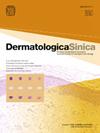Diosmetin ameliorates imiquimod-induced psoriasis by regulating apoptosis and inflammation via toll-like receptor 4/nuclear factor kappa B pathway
IF 2.2
4区 医学
Q2 DERMATOLOGY
引用次数: 0
Abstract
Background: Psoriasis is a common skin inflammatory disease. Dysregulated growth and differentiation of keratinocytes are the main characteristics of psoriasis. Diosmetin is a naturally occurring flavonoid with antioxidant, anti-inflammatory, and antibacterial properties. However, the anti-psoriatic role and mechanism of diosmetin remain unclear. Objectives: To investigate anti-psoriatic role and mechanism of diosmetin. Methods: Human immortalized epidermal cells (HaCaT) were treated with tumor necrosis factor-alpha (TNF-α) to establish the cell model of psoriasis. Mice were treated with imiquimod (IMQ) to establish the animal model of psoriasis. Cell viability and apoptosis were detected by methyl thiazolyl tetrazolium and flow cytometry, respectively. Reverse transcription-quantitative polymerase chain reaction and ELISA assays were performed to detect the expression of interleukin (IL)-6 and IL-8. Hematoxylin and eosin staining was used to detect the skin lesion. Results: Diosmetin reduced cell viability and promoted the apoptosis of TNF-α-induced HaCaT. Protein expression of Bax in TNF-α-induced HaCaT was up-regulated, while Bcl-2 was down-regulated by diosmetin. Diosmetin attenuated TNF-α-induced increase in IL-6 and IL-8 in HaCaT. The enhanced protein expression of toll-like receptor 4 (TLR 4) (toll-like receptor 4), p65 and IκBα phosphorylation, as well as reduced IκBα in TNF-α-induced HaCaT were restored by diosmetin. Diosmetin improved IMQ-induced skin lesion and attenuated inflammatory response in psoriasis-like mouse model. Conclusion: Diosmetin exerted anti-inflammatory and pro-apoptotic effects on TNF-α-induced HaCaT and IMQ-induced mice through inactivation of TLR4/nuclear factor kappa B pathway.薯蓣皂苷通过toll样受体4/核因子κ B通路调节细胞凋亡和炎症,改善吡喹莫德诱导的银屑病
背景:银屑病是一种常见的皮肤炎症性疾病。角化细胞生长和分化失调是银屑病的主要特征。薯蓣皂苷是一种天然存在的类黄酮,具有抗氧化、抗炎和抗菌的特性。然而,薯蓣皂苷的抗银屑病作用及其机制尚不清楚。目的:探讨薯蓣皂苷的抗银屑病作用及其机制。方法:用肿瘤坏死因子α (TNF-α)处理人永生化表皮细胞(HaCaT),建立银屑病细胞模型。用咪喹莫特(IMQ)治疗小鼠,建立牛皮癣动物模型。分别用甲基噻唑四氮唑和流式细胞术检测细胞活力和凋亡。采用逆转录-定量聚合酶链反应和ELISA法检测白细胞介素(IL)-6和IL-8的表达。采用苏木精和伊红染色检测皮肤病变。结果:薯蓣皂苷降低肿瘤坏死因子-α-诱导的HaCaT细胞活力,促进细胞凋亡。在TNF-α-诱导的HaCaT中,Bax蛋白表达上调,薯蓣皂苷下调Bcl-2蛋白表达。薯蓣皂苷可减弱TNF-α-诱导的HaCaT中IL-6和IL-8的升高。在TNF-α-诱导的HaCaT中,黄芪皂苷恢复了toll样受体4 (toll-like receptor 4)、p65和i - κ b α磷酸化水平的升高,以及i - κ b α水平的降低。薯蓣皂苷改善imq诱导的银屑病样小鼠模型皮肤损伤,减轻炎症反应。结论:薯薯素通过使TLR4/核因子κ B通路失活,对TNF-α-诱导的HaCaT和imq诱导小鼠具有抗炎和促凋亡作用。
本文章由计算机程序翻译,如有差异,请以英文原文为准。
求助全文
约1分钟内获得全文
求助全文
来源期刊

Dermatologica Sinica
DERMATOLOGY-
CiteScore
2.80
自引率
20.00%
发文量
28
审稿时长
>12 weeks
期刊介绍:
Dermatologica Sinica aims to publish high quality scientific research in the field of dermatology, with the goal of promoting and disseminating dermatological-related medical science knowledge to improve global health. Articles on clinical, laboratory, educational, and social research in dermatology and other related fields that are of interest to the medical profession are eligible for consideration. Review articles, original articles, brief reports, case reports and correspondence are accepted.
 求助内容:
求助内容: 应助结果提醒方式:
应助结果提醒方式:


